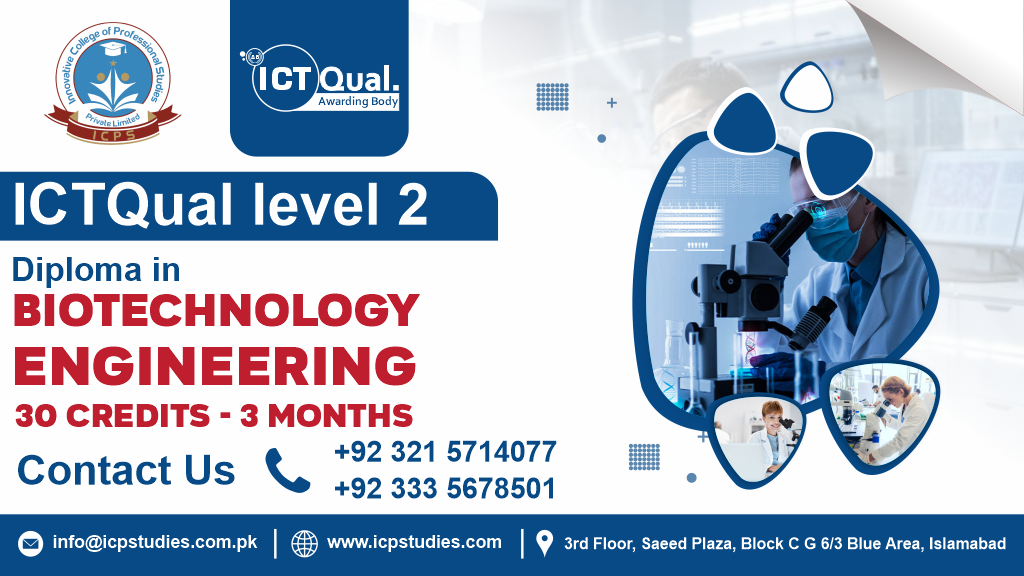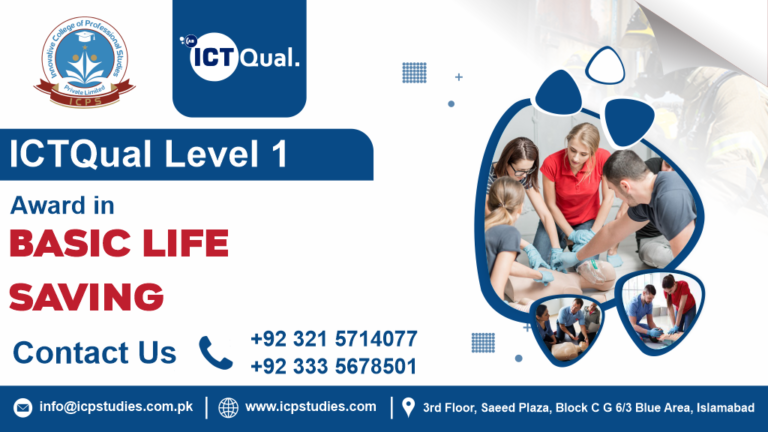The ICTQual Level 2 Diploma in Biotechnology Engineering is a comprehensive qualification aimed at providing learners with a foundational understanding of biotechnology engineering principles. Over the course of three months, you will gain knowledge in key areas such as bioprocessing, genetic engineering, microbiology, and biotechnology applications in various industries. The course is designed to provide both theoretical knowledge and practical skills through interactive learning and real-world applications.
This diploma will help you build a solid foundation in biotechnology, opening doors to exciting career opportunities in biotechnology research, industrial applications, and bioengineering.
The ICTQual Level 2 Diploma in Biotechnology Engineering (30 Credits) focuses on equipping students with a broad understanding of biotechnology processes and practices. The course is structured to cover key aspects of biotechnology engineering, including microbiology, bioinformatics, bioprocessing, and genetic engineering, making it highly relevant to modern industrial applications.
The ICTQual Level 2 Diploma in Biotechnology Engineering (30 Credits) offers an excellent opportunity for individuals to enter or advance in the dynamic field of biotechnology. Over the span of 3 months, students gain both the theoretical knowledge and practical skills needed to thrive in industries like healthcare, agriculture, and environmental science. Whether you’re just starting your career, changing fields, or looking to specialize, this course provides the perfect foundation for a successful career in biotechnology engineering.
All About ICTQual Level 2 Diploma in Biotechnology Engineering 30 Credits – 3 Months
Course Overview
The ICTQual Level 2 Diploma in Biotechnology Engineering (30 Credits) is an intensive 3-month program designed to provide students with a solid foundation in the rapidly advancing field of biotechnology. This diploma is ideal for individuals who are looking to develop the knowledge and practical skills necessary to succeed in biotechnology, bioengineering, and related industries such as pharmaceuticals, healthcare, agriculture, and environmental science.
Throughout the course, you will explore essential topics like genetic engineering, microbiology, bioprocessing, and biotechnology applications. The course blends theoretical learning with hands-on laboratory practice, ensuring that you gain both the technical expertise and practical experience to thrive in the field. Whether you are new to the industry or looking to enhance your existing knowledge, this qualification will prepare you for a wide range of roles in biotechnology engineering.
By the end of the program, you will have the skills to contribute effectively to research, development, and production processes in biotechnology, and be equipped with a recognized qualification that can open doors to career advancement and further study in this exciting field.
Study Units
- Introduction to Biotechnology Engineering
- Engineering Principles in Biotechnology
- Health, Safety, and Ethical Considerations in Biotechnology Engineering
The ICTQual Level 2 Diploma in Biotechnology Engineering (30 Credits) is designed to be accessible to individuals with a range of academic and professional backgrounds. However, there are some basic entry requirements to ensure that students are well-prepared for the course. Here are the recommended qualifications and skills:
1. Age
- Applicants should be at least 16 years old to enroll in this course.
2. Educational Background
- A general secondary education (GCSEs or equivalent) is recommended.
- A basic understanding of science (particularly biology, chemistry, or physics) is beneficial as it provides the foundation for understanding biotechnology principles.
- Although not mandatory, students with a background in maths and English will find the course more manageable, as these subjects support the technical and theoretical aspects of biotechnology.
3. Prior Experience
- No formal prior experience in biotechnology is required. However, individuals with an interest in biological sciences or a technical background may find the course easier to follow.
- Those with experience in related fields such as engineering, healthcare, or laboratory work can also benefit from the course, as it will help them specialize in biotechnology applications.
4. English Language Proficiency
- Basic proficiency in English is required, as the course materials, assessments, and practical work are conducted in English. Non-native English speakers may need to demonstrate their language skills through recognized tests or qualifications.
5. Motivation and Commitment
- As the course is designed to be completed in 3 months, students should be motivated and prepared to engage in a focused and intensive learning experience.
- The course requires both theoretical study and practical work, so students should be committed to completing assignments, attending workshops, and participating in lab-based activities.
If you meet these requirements and have a passion for the rapidly evolving field of biotechnology, this course offers a great opportunity to start or enhance your career in biotechnology engineering.
The ICTQual Level 2 Diploma in Biotechnology Engineering (30 Credits) is designed for a wide range of individuals interested in pursuing a career or advancing their skills in the biotechnology and bioengineering sectors. This course is ideal for anyone looking to gain essential knowledge and practical experience in biotechnology, from newcomers to the field to those seeking to specialize in specific areas of biotechnology engineering. Here’s who will benefit most from this course:
1. Aspiring Biotechnology Engineers
If you’re passionate about biotechnology and want to start a career in the industry, this diploma is an excellent entry point. It provides the foundational knowledge needed to understand biotechnology systems and processes, preparing you for entry-level roles in various biotech industries.
2. Current Laboratory Technicians
For those already working in laboratory settings or related fields, this course offers an opportunity to specialize in biotechnology. It will enhance your understanding of biotechnological processes, from genetic engineering to bioprocessing, and make you more competitive in the field.
3. Graduates in Science or Engineering
Individuals with a background in biology, chemistry, engineering, or related fields can use this diploma to pivot into biotechnology. It provides specialized knowledge and hands-on experience that can open doors to roles in biotechnology research, industrial applications, and bioengineering.
4. Science Enthusiasts with an Interest in Biotechnology
If you have a strong interest in science, particularly in the areas of genetics, microbiology, or biochemistry, this course will help you build the skills to turn that passion into a rewarding career. You’ll gain practical experience in laboratory work, bioprocessing, and biotechnology applications.
5. Career Changers
Professionals from other technical, engineering, or healthcare fields who are looking to transition into biotechnology will find this diploma to be a great starting point. It offers the knowledge and skills required to make that transition smoothly and with confidence.
6. Those Interested in Biotechnology Applications
This course is also ideal for individuals who are interested in how biotechnology can be applied to real-world challenges. Whether it’s improving healthcare outcomes, addressing environmental issues, or advancing agricultural practices, biotechnology is transforming industries—and this diploma equips you with the skills to be a part of that change.
7. Entrepreneurs and Innovators
For those looking to start their own ventures or businesses in the biotechnology field, this diploma provides the technical foundation needed to understand how biotechnology systems work and how they can be applied to solve global challenges, from healthcare solutions to sustainable food production.
In short, the ICTQual Level 2 Diploma in Biotechnology Engineering is for anyone passionate about biotechnology, whether you’re just starting your career, changing fields, or looking to expand your expertise. With practical skills and a strong theoretical foundation, this course will help you take the next step in the biotechnology industry.
Learning Outcomes
Upon successful completion of the ICTQual Level 2 Diploma in Biotechnology Engineering, students will be able to demonstrate the following key learning outcomes:
1. Introduction to Biotechnology Engineering
- Understand fundamental concepts of biotechnology and its practical applications across various industries such as healthcare, agriculture, and environmental science.
- Demonstrate basic laboratory skills, including the safe handling of equipment and conducting experiments within a biotechnology setting.
- Describe key biotechnological processes, such as genetic engineering, fermentation, and bioreactor operations, and understand their roles in modern engineering solutions.
- Apply theoretical knowledge of biotechnology to real-world scenarios, showcasing an understanding of how biotechnology integrates with modern engineering challenges.
2. Engineering Principles in Biotechnology
- Gain foundational knowledge of essential engineering principles, including mechanical, electrical, and bioengineering concepts, relevant to biotechnology applications.
- Solve practical engineering problems within biotechnology, such as designing, optimizing, and scaling bioreactor systems to improve efficiency and output.
- Understand the intersection between engineering and biotechnology, applying engineering principles to optimize biotechnological processes and enhance product yields.
- Demonstrate the ability to optimize engineering processes in biotechnology, focusing on increasing efficiency, scalability, and overall performance in biotechnological systems.
3. Health, Safety, and Ethical Considerations in Biotechnology Engineering
- Recognize and apply essential health and safety protocols in biotechnology laboratories and engineering environments, ensuring safe handling of materials, chemicals, and equipment.
- Understand and comply with regulatory standards and best practices in biotechnology engineering, ensuring the responsible implementation of biotechnological processes.
- Analyze and address ethical considerations within biotechnology, particularly in areas such as genetic modification, environmental impact, and sustainable practices.
- Apply ethical decision-making in biotechnology engineering projects, ensuring alignment with industry standards and maintaining ethical integrity throughout the engineering process.
These learning outcomes ensure that students graduate with the knowledge, skills, and ethical understanding necessary to succeed in the biotechnology engineering field, making them valuable assets to any organization in the industry.
FAQs about ICTQual Level 2 Diploma in Biotechnology Engineering 30 Credits – 3 Months







